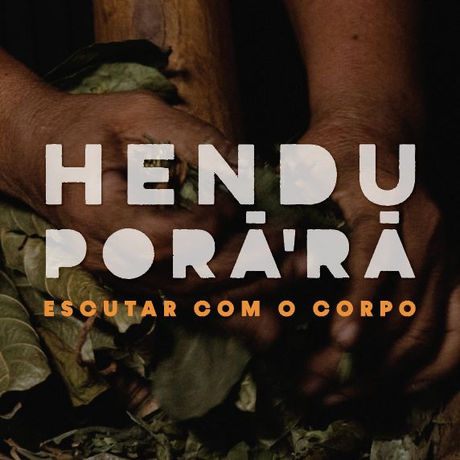CURATORIAL COORDINATION OF THE MUSEUM OF INDIGENOUS CULTURES
Outra Margem is responsible for the Curatorial Coordination of the Museum of Indigenous Cultures, actively participating in the research and development of projects for new exhibitions alongside indigenous curators and artists and the Aty Mirim Indigenous Council.
Exhibition "Nhe`ery - where spirits bathe"
Nhe’ẽ ry is a way of understanding the dimension of the forest, a sanctuary that can transform into a portal. It can be translated as “where spirits bathe”, purify themselves to have divine elevation, integrating the cosmological world to have spiritual lightness and eternal life – in the Guarani conception, the Yvy Marae’ỹ.
The Nhe’ẽ ry is the basis of existence and resistance for the indigenous people who live there, as it is in the living forest that the medicines that heal and the true school are found: the transmission of ancestral knowledge and practices. She is of great importance, as she holds the soil with her hands and provides us with water and food. The great spirits are in its leaves and roots. With each leaf that falls, another is born as a child, and thus all life is formed within the forest.
This exhibition seeks to bring a vision of the spirits that inhabit the forest. Each plant, animal and mineral being has its own profound Wisdom. The guardian spirits of everything that inhabits it are connected with the original people who emerge from Nhe’ẽ ry.
Outra Margem was responsible for creating the conceptual project and curatorial coordination (Andreia Duarte, Arami Argüello and Juliana Pautilla).
Exhibition "HENDU PORÃ’RÃ, listening with the body"
“This is a collective authorship exhibition, and it is very important that it is so.” It talks about curators Karaí Márcio, Sônia Ara Mirim, Tamikuã Txihi – residents of Tekoás do Jaraguá (SP) and also Guarani curator, Sandra Benites. To combat discrimination and the erasure of the trajectory of resistance of the residents of Tekoás do Jaraguá (SP) and the Guarani people who have suffered because of a non-indigenous society for a long time, the process of building the collective exhibition Hendu Porã'rã began through of meetings and conversations, focusing on listening to the community itself and some leaders from different territories. The proposal intended to think about the concepts that would approach the exhibition, in addition to evaluating the most urgent needs that the curators would like to provoke.
As the curators explain: “repeatedly, everyone brought up the issue of resistance and the fight for their territories, which are also present in their cultural practices. It is worth highlighting here that it is not just about housing, but also about the preservation and recovery of nature, of the parts that believe to make up the entire existence (rivers, forests, plants and animals), the defense of the whole, of the elements human and non-human, of the Ijaras – spiritual protectors of rivers, forests and animals. In this way, we built a proposal to show Juruá society (non-indigenous) that we are not only discussing the issue of territorial demarcation of housing, but are larger issues that deal with the principles of our life”.
For the Guarani people, “Hendu” means to listen; but not just with the ear, but with the entire body. Therefore, this collective exhibition proposes to transmit to the public an in-depth reflection, with the body and with dialogue, teaching about the Guarani way of being in the world, allowing greater understanding and understanding. For the curators, when society truly understands, understands and listens with its body, it will know the importance of the struggle and resistance of indigenous populations in general, as well as the struggle of all Guarani.
ABOUT THE MUSEUM OF INDIGENOUS CULTURES
Located in the capital of São Paulo, the Museum of Indigenous Cultures is an institution of the Secretariat of Culture and Creative Economy of the Government of the State of São Paulo managed by ACAM Portinari (Cultural Association of Support to the Casa de Portinari Museum) - Social Organization of Culture in partnership with the Maracá Institute, a non-profit association whose purpose is to protect, disseminate and enhance indigenous cultural heritage.
It is a space for intercultural dialogue, plurality, and encounters between indigenous and non-indigenous peoples, where the memory of ancestry will allow the various native peoples to share their messages, ideas, knowledge, philosophies, music, arts, and stories.
R. Dona Germaine Burchard, 451, Água Branca - São Paulo/SP - CEP: 05002-060
ABOUT THE MARACÁ INSTITUTE
Non-governmental organization with the purpose of protecting and disseminating the historical, environmental and cultural heritage of indigenous peoples.











